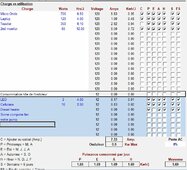JohnD0h
New Member
Hi everyone and thanks again for your help!
You make me redo my homework.
The first year, I’ll have access to the AC from where I’ll do my build so I only need DC for led, diesel heater, water pump some computer fans… if I don’t miss anything and for that I can go with a Li Time 12V or 12.8V 100Ah and a fuse box and keep the cost around CAD 500$.
And in a year I'll build a second system separate from this.
So I have one more year for planning my electrical system!
My van will be isolate and heat all the winter with a diesel heater.
Cooking and fridge will be on propane.
I don't want anything else than LiFePO4 Lithium Battery.
I know that my need will be around 2KWh/day and I want around 5KWh to 6KWh in battery.
So my second system will need to have 4KWh to 5KWh.
I keep the door open to go 12V, 24V, 48V!
***The goal of my post is to learn what do I need in my system to:***
---------------------------------------------------------------------------------------------------------------------------------------------------------------
I have a question for my fellow Canadians who have solar panels installed horizontally on the roof of their vehicle!
I want to know how much cost effective it’s and what performance it give you during summer and winter in Canada?
If I choose to add solar to my build, it’ll probably be a panel between 400W to 550W and 60 or 66 cells minimum, from what I know about solar for now.
Thanks!
---------------------------------------------------------------------------------------------------------------------------------------------------------------
What do I need to charge with an EV public charger (7.2kW)?
What do I need to charge with a car alternator?
What do I need to plug in a camping site?
What do I need to plug in a 120V AC house?
I have see on YouTube some people who have use the EV public station to charge the battery in their VR and that was working.
The best info I have found is from this video and it's look like it's working well with his 24V 300Ah battery:
From what I understand so far is that the terminal has a voltage of 240V, a useful power of 7.2KW with a J1772 connector.
With a 240V to 12V/24V charger, a J1772 to NEMA adapter, it is possible to charge 12V and 24V batteries.
I'm here to learn more details about how and with what I'll able to do it and have more user feedback.
It'a 4 minutes video, please take the time to watch it before answering something about EV charger.
Thanks for your reply, nothing again nobody, but come on guys, try to keep my post clean as possible, and it probably already have a lot of post where you can talk about the rest that I'm not here to learn!
Look at the first post in page 2 to see what I'm looking for now! Thanks!

Pat
You make me redo my homework.
The first year, I’ll have access to the AC from where I’ll do my build so I only need DC for led, diesel heater, water pump some computer fans… if I don’t miss anything and for that I can go with a Li Time 12V or 12.8V 100Ah and a fuse box and keep the cost around CAD 500$.
And in a year I'll build a second system separate from this.
So I have one more year for planning my electrical system!
My van will be isolate and heat all the winter with a diesel heater.
Cooking and fridge will be on propane.
I don't want anything else than LiFePO4 Lithium Battery.
I know that my need will be around 2KWh/day and I want around 5KWh to 6KWh in battery.
So my second system will need to have 4KWh to 5KWh.
I keep the door open to go 12V, 24V, 48V!
***The goal of my post is to learn what do I need in my system to:***
---------------------------------------------------------------------------------------------------------------------------------------------------------------
I have a question for my fellow Canadians who have solar panels installed horizontally on the roof of their vehicle!
I want to know how much cost effective it’s and what performance it give you during summer and winter in Canada?
If I choose to add solar to my build, it’ll probably be a panel between 400W to 550W and 60 or 66 cells minimum, from what I know about solar for now.
Thanks!
---------------------------------------------------------------------------------------------------------------------------------------------------------------
What do I need to charge with a car alternator?
I have see on YouTube some people who have use the EV public station to charge the battery in their VR and that was working.
The best info I have found is from this video and it's look like it's working well with his 24V 300Ah battery:
From what I understand so far is that the terminal has a voltage of 240V, a useful power of 7.2KW with a J1772 connector.
With a 240V to 12V/24V charger, a J1772 to NEMA adapter, it is possible to charge 12V and 24V batteries.
I'm here to learn more details about how and with what I'll able to do it and have more user feedback.
It'a 4 minutes video, please take the time to watch it before answering something about EV charger.
Thanks for your reply, nothing again nobody, but come on guys, try to keep my post clean as possible, and it probably already have a lot of post where you can talk about the rest that I'm not here to learn!
Look at the first post in page 2 to see what I'm looking for now! Thanks!
Pat
Attachments
Last edited:



